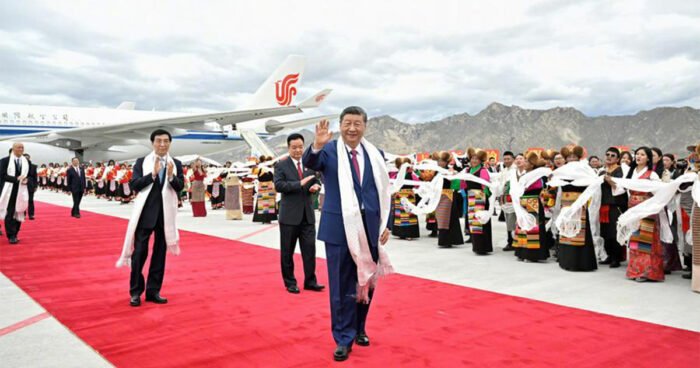China’s President Xi Jinping has made an unannounced trip to Tibet, where he presided over a mass gathering in Lhasa to mark six decades since Beijing established the autonomous region, the BBC reports.
A comment on the Chinese State Council homepage marking the visit, however, made no mention of the name Tibet, instead reporting that “Chinese President Xi Jinping on (Thursday) attended a grand gathering at the Potala Palace square in Lhasa, capital of Xizang Autonomous Region, to mark the region’s 60th founding anniversary.”
The visit, only his second to Tibet since becoming president, placed emphasis on unity, stability and development. Xi commended regional leaders for their stance against separatism, reflecting Beijing’s long struggle to contain Tibetan resistance and it is likely no coincidence that his visit follows recent discussions on succession issues to follow the passing of the current Dalai Lama – the spiritual leader of the region currently in self-imposed exile in India.
Xi’s appearance in the capital at an altitude often challenging for outsiders was seen as a show of political authority.
Absent from his remarks, however, was any reference to the Dalai Lama, who fled to India in 1959 and has since remained in the north of the country, the BBC added.
The Tibetan spiritual leader has long advocated meaningful self-rule within China, a proposal rejected by Beijing, which regards him as a separatist. Tensions resurfaced recently after the Dalai Lama stated his office, rather than China, would determine his eventual successor – a position firmly opposed by Beijing.
China’s leadership argues that economic growth, improved living standards and religious freedom have transformed life in Tibet since 1965, when the Tibet Autonomous Region, known in Chinese as Xizang, was created following a failed uprising. Human rights organisations, however, claim traditional Tibetan identity and freedoms are being steadily eroded. Monks and other Tibetans have alleged suppression and persecution by the Communist Party, charges consistently denied by Beijing.
State media presented Xi’s tour as a celebratory occasion, broadcasting images of dancers and cheering crowds welcoming him in Lhasa – much of which would have been heavily choreographed.
In talks with local officials, attended by senior party leaders, Xi reportedly outlined what he described as the central tasks for Tibet: safeguarding political stability, encouraging development, protecting the fragile environment and reinforcing China’s borders. He also promoted greater use of the national language, strengthened cultural and economic exchanges, and tighter oversight of religious practices, with the aim of aligning Tibetan Buddhism more closely with China’s socialist values.
The trip comes amid major new infrastructure work in the region. Last month, Beijing began construction on what is expected to become the world’s largest dam, the Motuo Hydropower Station on the Yarlung Tsangpo river. Once complete, it would surpass the Three Gorges project and could produce three times as much energy. Officials in China say the scheme will balance ecological protection with economic benefit, but neighbouring countries including India and Bangladesh have raised concerns that the project could give Beijing significant control over downstream river flows.







